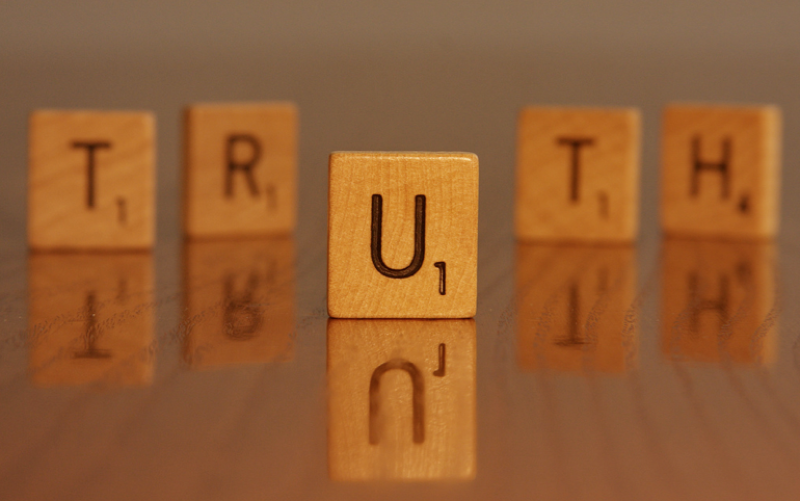What do we do when the facts don't matter?

As a journalist by training, I have what you might call an addiction to facts. I believe that there are things that are true and things that are not, and that we can determine one from the other through observation, rational thought, and meticulous research. Obviously, there are some things that remain open to debate (philosophy for example) and areas where the science hasn't been completely locked down – psychology and most of the humanities fall into this category, I think, along with things like quantum mechanics and the way that the human brain works. What do we mean by consciousness, and how do we know when something possesses it? That kind of thing. On those kinds of topics, debate is plentiful and certainty is difficult to come by. On the other hand, many things are solidly in the realm of the factual – that the Earth is round (ish), that men landed on the moon, that vaccines are pretty much the greatest thing humanity has ever come up with, that jet fuel can melt steel beams, and so on.
The unfortunate reality of the age we live in is that some people disagree with some or all of those statements, and many others that are usually taken for granted as fact. They don't just disagree about the nature of the universe, they disagree that the Earth is round; they don't just disagree about the nature of the moon landing, they believe that a conspiracy theory involving the Deep State (whatever that is) has kept the truth from us for decades. And they don't just question the efficacy of vaccines, but believe the government deliberately created COVID and then injected us to control our minds. What are these disagreements based on? In many cases, it's what the kids call "vibes." Reddit posts and bad videos and Facebook links from questionable people who are a) mentally ill, b) pushing some quack remedy, c) trying to generate fear so they can sell advertising, or d) all of the above. All of this is augmented by confirmation bias, fundamental attribution errors, apophenia (a desire to see patterns where they don't exist), and a host of other cognitive mistakes that human beings are prone to make.
I think about these things a lot, for some pretty obvious reasons [gestures vaguely in all directions] but most recently my thoughts turned in that direction again because I read a recent piece in New York magazine titled "Why calling RFK Jr. anti-science misses the point - Battling over truth, facts, and evidence doesn’t work in a post-expertise world," by Rachel Bedard, a doctor from Brooklyn. She describes what America is going through as an "epistemological crisis," particularly in the areas of health and medicine (although I would argue that it extends into many other areas of science and technology). For anyone who is unclear on the meaning of the term, epistemology is the study of the nature, origin, and limits of human knowledge — in other words, how we know what we know. It is an investigation into the nature of belief, and what distinguishes justified belief from mere opinion. Bedard describes the problem in this way:
Issues previously contested at the fringes of politics without clear ideological valence — vaccines and fluoridation, nutrition and the chronic-disease epidemic, whether and how to fund cancer research — have become central to a polarized debate not just about what’s right but about what is real. According to a Kaiser poll, nearly one in four Americans report they have “not too much or no confidence at all” that scientists operate with the best interests of the public in mind, and nearly half think scientists should play less of a role in policy debates.
Note: In case you are a first-time reader, or you forgot that you signed up for this newsletter, this is The Torment Nexus. You can find out more about me and this newsletter in this post. This newsletter survives solely on your contributions, so please sign up for a paying subscription or visit my Patreon, which you can find here. I also publish a daily email newsletter of odd or interesting links called When The Going Gets Weird, which is here.
A loss of consensus

After a period in which science was treated as synonymous with truth, Bedard argues, large chunks of America have lost the consensus they used to have with the rest of society about how to distinguish facts from falsehoods, and "Robert F. Kennedy Jr. and the Make America Healthy Again movement marched through that rift as they rose to power." This is a man who has said in a video interview that he had difficulty paying attention in school until he took heroin. He repeatedly makes statements that have no basis in fact, like the statement that the polio vaccine killed more people than it saved (he also said that Lyme disease is "likely a militarily engineered bioweapon." The mistake many people make, according to Bedard, is they describe Kennedy’s crusade against vaccination (or his opposition to the germ theory of disease) as a "war on science." But what makes the battle against Kennedy and the MAHA movement so difficult is that their statements are couched in the language of rigorous science:
He says his war is against an Establishment that was doing science all wrong: bureaucrats who relied on bad data riddled with conflicts of interest, ignored inconvenient truths, and promoted guidance that made us sicker. He and his followers advance their arguments in the language of science: randomized controlled trials, transparency, peer review, replicability. In a recent interview with Tucker Carlson, when asked about his pledge to discover the causes of autism, Kennedy went on to offer a lengthy alternative history of how controversial autism research has been suppressed. “We’re going to do the kinds of studies that the Institute of Medicine originally recommended, and we’re going to do observational studies, retrospective studies, and epidemiological studies. We’re going to do real science,” he said.
"Real science," of course, seems to mean appointing people who used to be medical doctors but dropped out in order to promote a 'wellness" agenda based on snake oil, or a well-known vaccine skeptic to 'research' the alleged ties between vaccines or environmental contaminants and autism. And how have the medical establishment and public-health experts tried to fight back against this incursion of agenda-based 'science?' As Bedard notes, their preferred weapons include "the fact check, the New York Times editorial, the alarmed open letter [and] the “Infectious-disease expert here: Let me explain why that’s wrong” X (or Bluesky) thread." That's because a scientist's preferred response to incorrect facts or assumptions is to present more evidence, in order to help convince the other person of their mistakes. But this only works if the other person is willing to listen, or is open to admitting that they might be wrong.
One of the most difficult aspects of the current atmosphere is that the people with the most incorrect views are passionately convinced that they are right – to the point of shouting about it online at every opportunity – and are unwilling to accept any arguments to the contrary, no matter how factual or scientifically airtight they might be. As Yeats said in The Second Coming, the best lack all conviction and "the worst are full of passionate intensity." If you advance a case, complete with extensive research and links to multiple authoritative sources, they will respond with their own 'research,' culled from their own 'authoritative' sources, with links to similar arguments from a Reddit thread with a moderator who pretends to be a scientist, or an in-depth 'research paper' (that hasn't been peer reviewed) that contains 'facts' that have been hallucinated into being by people who are mentally unstable or are trying to capitalize on fear.
I've been writing about aspects of this problem for years now, since before the first time Trump became president. I don't think that Trump and his campaign invented this epistemological crisis – I think he understood that it was happening on a kind of instinctual level, and perceived it as an opportunity to win by "flooding the zone with bullshit," as his former advisor Steve Bannon put it). I think the problem itself is a result of the single most massive explosion of democratized information the world has ever seen, at least since the invention of the printing press – in other words, the internet. In the not-so-distant past, doctors and scientists and other experts were trusted because there was literally no other choice. Research was bottled up in paywalled journals. And yes, there was a lot of bad research, and questionable conclusions based on racism, sexism, and other isms. Is questioning bad research good? Of course it is. But questioning everything over and over, to the point where you are willing to believe anything that says the opposite, helps no one.
Shouting facts doesn't work

It's not quite right to say that Trump is part of this trend of people questioning facts using dubious pseudo-research, because he doesn't question facts in that way – he just says things that he knows to be untrue and dares the media and others to question him. This, unfortunately, turns out to be a surprisingly effective strategy. It seems absurd now, but when Trump first arrived on the scene as a political candidate, I (among others) struggled with how to handle his routine and enthusiastic use of lies. Believe it or not, I got in trouble with the publisher of Fortune magazine for writing a piece arguing that we should use the L word for what he was doing, because he met the legal standard – that is, someone who is in a position to know the facts, but deliberately says the opposite anyway. The publisher disagreed strenuously with my argument, and ultimately asked to see everything I wrote about Trump before publication, and not long afterward I was told my services were no longer needed at Fortune.
In some cases, I think the desire to counter established research with "alternative facts" stems from a fear about the government and how it has used science to political ends in the past (experimenting on Black men with syphillis, for example, or looking the other way while the sugar industry relied on distorted research, or promoting smoking in the military for stress relief). A healthy skepticism is fair and valid. But many of those who question vaccines or other medical and scientific research are not driven by that kind of rational fear – they are driven by free-floating fear of almost everything, or by a desire to appear more knowledgeable than they actually are, or by a desire for power and authority, or as a result of an emotional or mental illness of some kind, or as part of a cravenly capitalistic drive to profit from the ignorance and misery of others. That kind of thing also has a long and tortuous history in America, unfortunately.
One strategy for dealing with the profusion of alternate facts and distrust is to try to understand the motivations of those promoting the information. But what if that isn't possible? This may seem counter-intuitive, but I think one strategy, which Dr. Bedard seems to support, is to actually be less certain and authoritative, not more. If bombarding people with facts isn't working, then perhaps we should try talking about how difficult some of these questions actually are, and how scientists are making a good-faith effort to find the answers. As Bedard notes:
For many frequently prescribed medicines, including Tylenol and most psychiatric drugs, we aren’t exactly sure how they work or whether they’ll reliably work in a given person. The exact effect of a medication in an individual patient is a matter of prediction, not certainty. The pediatric vaccine schedule is determined by taking into account not just data about vaccine safety and efficacy but also values like cost and equity. So are recommendations about when women should get screening mammograms; these guidelines have changed several times over my career as a physician. How Lyme disease is defined — what constellation of signs and symptoms constitute the diagnosis — is another question that hinges on expert consensus, and it’s a point of great debate because many people who believe they have chronic Lyme disease fall outside that definition.
Perhaps if we tried to be more honest about the unknowns in science, and more open to those with genuine questions or criticisms (as opposed to those driven by financial or political agendas), we wouldn't give so much oxygen to the crazy end of the spectrum of denialists. Perhaps it's the god-like certainty of some of the statements on science and medicine that sparks such skepticism. I don't know the right answer, but I know that simply shouting facts at people or trying to delete their skepticism from the internet doesn't really work. If someone is quoting 'alternative' research out of fear, reciting facts at the top of your lungs isn't going to help. It's probably going to make the problem worse.
Got any thoughts or comments? Feel free to either leave them here, or post them on Substack or on my website, or you can also reach me on Twitter, Threads, BlueSky or Mastodon. And thanks for being a reader.



